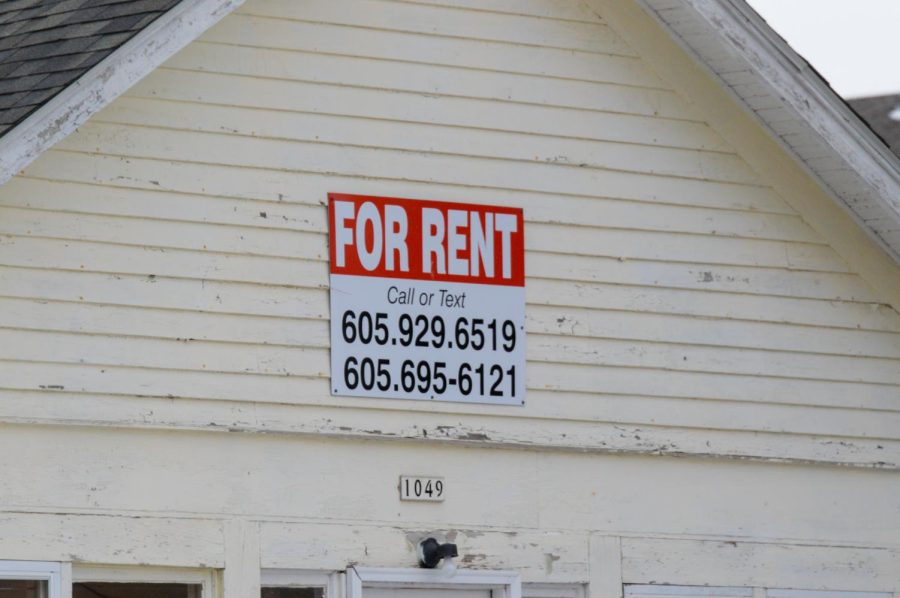City Council to review 3-to-a-dwelling ordinance
March 8, 2022
A city ordinance that limits occupancy in homes could be changed thanks to an effort led by SDSU student Jonathon Sundet.
The measure, ordinance 22-374, restricts residences within city limits from having more than three unrelated people living in one house. Families, including cousins, are not affected by this restriction.
“If you want to get a place with three of your friends, you can’t really do it legally,” Sundet said. “There’s a lot of people who will call their fourth person their cousin [to get around the ordinance].”
Sundet talked to Brookings City Councilor Joey Collins about his opposition to the ordinance. Together they have worked to address the issue, successfully getting the city planning commission to discuss the ordinance and scheduling a study session for council members later in March.
Sundet and Collins want to see the ordinance changed to allow for one person per legal bedroom, but admit a change that drastic from the current ordinance could be unlikely. For Sundet and Collins, just increasing the legal number of residents from three to four unrelated persons would be a win.
“[The other council members] are going to be saying that parking is a big deal and people that rent homes are going to have to make one more spot for parking,” Collins said.
Sunset said: “My issue with that is that you could have the same issue if people are related. The ordinance isn’t helping the problem they think they’re solving.”
Support for the effort among the members of the council has been slow-going, Collins said, citing the parking concerns specifically. Still, he is optimistic about the effort and the effect it would have on students renting.
“If you can have more bedrooms and get more people in there, rent goes down for students,” Collins said.
Sundet is organizing people to come and speak to ensure the council is hearing a diverse set of opinions. “I’m hoping more people will be in favor because of that,” he said.
The South Dakota State University Students’ Association passed a resolution in support of the proposed amendment to the ordinance, but SA President Andrew Rasmussen cautioned the senate that their involvement couldn’t end there.
“I encourage you all to get in touch with city councilors … We passed this unanimously and gave the students a voice, but it’s going to take more than that to get this changed at the city level,” he said.
SA Government Affairs Chair Anna Shane is hopeful that the ordinance will be changed, but is concerned with the opposition on the city council.
“Myself and some others on SA have had conversations with some councilmembers and individuals with the city and there’s definitely a wide array of responses,” Shane said.
Shawn Storhaug, owner of Brookings Property Management, supports changing the ordinance.
“So you have a five-bedroom house, and you have this huge parking pad in the back,” Storhaug said. “And you can keep cars off the street. And you’re close to campus … Why would we say you can only have three unrelated in that house?”
Having affordable housing close to campus should be a goal for everyone, Storhaug said. He suggested that if Sundet’s initial effort fails, a compromise could be amending the ordinance to allow for more unrelated people in areas just near campus.
“If we’re going to be an attractive school, we should have housing options close to campus,” he said.
Storhaug said allowing more people to share a house would ultimately bring down rental prices because of the increased supply of homes. Sundet and Storhaug argue that allowing for more students to share a house will not increase chaos, but will allow for more affordable ways for students to live in Brookings.
“I’ve had some really good college kids in my rentals and I’ve had some really good families,” Storhaug said. “And I’ve had some terrible college kids and some terrible families.”
The Collegian reached out to Brookings Mayor Oepke Niemeyer for comment, but he said he would hold his comments about the proposed change until after the planning commission’s recommendation goes to the city council.
Collins and Sundet hope to accomplish this change by the beginning of the next school year, but for now their focus is to win the council’s support.
“For any change there will be people for and against it,” Sundet said. “It’s just the nature of change … Getting that conversation out there is important.”

























